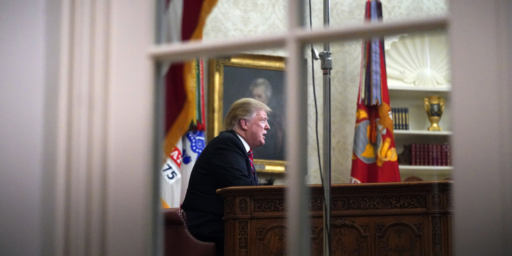Washington Ready To Vote On Bill To Avert Shutdown
If all goes well, the bill to avert another shutdown should become law today.

By all appearances, Washington appears to be on track to wrap up the funding and border security deal that will avert another government shutdown, and the President appears to be on board:
Lawmakers slogged toward completion of a massive spending bill and border security compromise Wednesday, preparing to pass it and send it to President Trump in time to avoid a government shutdown Friday at midnight.
The mood in the Capitol was less of enthusiasm than relief as negotiators finalized legislation that would end, for now, political brinkmanship over Trump’s demands for money for a southern border wall. Those demands produced the nation’s longest partial government shutdown before it ended late last month after 35 days.
The days of negotiations that followed produced a deal offering Trump less than a quarter of the $5.7 billion he wanted for barriers along the U.S.-Mexico border. Nevertheless, Trump is expected to sign the bill — although the president has changed his mind at the last minute before, creating a level of uncertainty.
Lawmakers finalized the 1,159-page bill just before midnight Wednesday, and votes were expected in the House and the Senate on Thursday. The legislation is expected to pass. Trump said that he has to see the final deal before deciding whether he can support it, but he reiterated his insistence that regardless of what Congress does, the border wall will get built.
“We will get the job done. The wall is very, very on its way. It’s happening as we speak,” Trump said at an event with law enforcement officials.
“It’s a big wall. It’s a strong wall. It’s a wall that people aren’t going through very easy,” Trump said. “They would be able to climb Mount Everest easier.”
Despite Trump’s claims, the government has not completed any new sections of wall under his administration.
Earlier, addressing reporters at the White House, Trump repeated his suggestion that he will be taking some type of executive action to get additional money for the wall, saying, “We have options that most people don’t understand.” Republicans widely expect the president to try to move money from existing accounts, including one or more within the Pentagon budget, to add to the border barrier money appropriated by Congress, although Democrats say they will challenge such efforts.
Trump also said: “I don’t want to see a shutdown. A shutdown would be a terrible thing.”
Lawmakers grappled with a series of last-minute disputes Wednesday as they sought to finalize the deal, including an ultimately unsuccessful push by Democrats to include back pay for thousands of federal contractors who were caught up in the last shutdown, and — unlike the 800,000 affected federal workers — have not been able to recoup their lost wages. There was also a dispute over whether to include an extension of the Violence Against Women Act, which expires Friday. Ultimately, negotiators omitted an extension, but Democrats who are working on a stronger stand-alone bill argued there will now be a greater impetus to get it done and said the expiration will have little impact because grants under the law will continue.
The overall compromise, struck by a bipartisan group of lawmakers on Congress’s spending committees, includes $1.375 billion for 55 miles of new fences along the border in Texas, compared with $5.7 billion Trump had sought for 234 miles of steel walls. It contains language Democratic negotiators say should limit detention capacity by the U.S. Immigration and Customs Enforcement agency, although Republicans insist ICE will be able to maintain and even increase existing detention levels, and some liberals said Wednesday they oppose the legislation for that reason.
The bill will provide $49.4 billion for the Homeland Security Department for the 2019 budget year, an increase of $1.7 billion above 2018 levels. The legislation also includes policy provisions specifying that members of Congress cannot be barred from accessing any facility housing children, and it contains language aimed at making it easier for separated children to reunite with family members in the U.S.
Combined spending on ICE and the Customs and Border Protection agency is around $23 billion, a figure Trump has begun touting to praise the legislation’s spending on border security.
The legislation wraps up Homeland Security spending with six other uncompleted appropriations bills for 2019, funding nine Cabinet departments and dozens of other agencies for a total price tag of around $324 billion. The other agencies covered include Commerce, Agriculture, Housing, State and the IRS, all of which would be funded through Sept. 30, the end of the fiscal year, presuming Trump signs the legislation. At that point, another fight over government funding — and, perhaps, the wall — will await.
The spending bill is far from perfect, of course, and there seem to be few Members of Congress or the Senate willing to go on the record as enthusiastic supporters of the bill. At the same time, though, it offers Republicans, Democrats, and the President what is likely the best they can get under the circumstances and that it does the important job of avoiding another disastrous government shutdown that likely would not have gone very well for either party. For Republicans and the President, there’s the fact that they got funding for border security, albeit not specifically designated for the President’s border wall. No doubt, in addition to whatever other actions he might take to try to get funding from other sources, the President will claim victory here, but that’s typical for him so there’s little that can be done about that. For Democrats, the compromise both averts a shutdown and denies the President a victory on his border wall, notwithstanding the fact that he will obviously claim otherwise.
In any case, if things go the way they are supposed today then the House and Senate will both quickly approve the bill that was made public last night. In the House, the process will be relatively easy since Democrats control the chamber and can use the Rules Committee to push the vote through relatively quickly. In the Senate, the pace of how things move could depend on whether or not anyone objects to the bill. If they don’t, then the bill can pass by unanimous consent and potentially without a voice vote. If they do, then the Senate will be required to go through the process of considering and voting on the bill, which could delay final resolution until tomorrow. In any case, the bill is still expected to pass the Senate and head to the White House where, unless he changes his mind yet again, which seems unlikely given what we’re hearing from the White House. Assuming all that happens, then this whole ordeal will finally be over. At least until September when we get to do it all over again.





So whether the Mango Toddler signs it or not probably boils down to someone on Fox calling him a sissy.
The man is so easily manipulated it’s painful to watch.